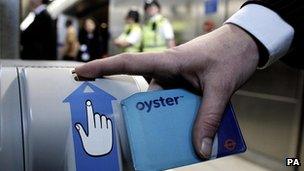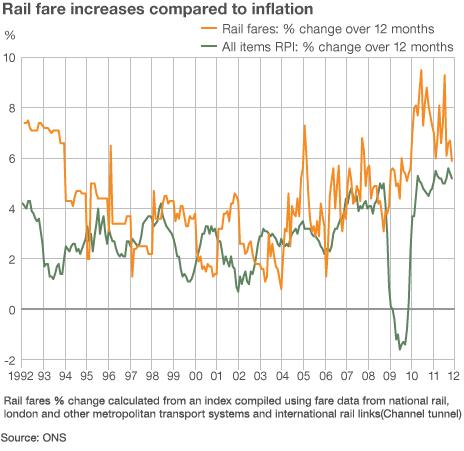Rail smart cards to be rolled out across UK
- Published
- comments

Smart cards, which can be topped up with money, will be rolled out across the country
Smart cards, like those already used in London, are to be rolled out across the country, the transport secretary says.
Oyster card-style ticketing, allowing people to swipe a pre-paid card on a reader, and more varied peak pricing were part of reforms announced to MPs.
Justine Greening wants £3.5bn annual efficiency savings and said "inflation-busting fare rises" would end.
Under the reforms, the government will accept many of therecommendations in Sir Roy McNulty's report, external.
Sir Roy criticised the level of rail workers' wages and said some ticket offices may have to be closed.
Sir Roy, a former civil servant commissioned by Whitehall to produce his report, estimated savings of between £700m and £1bn could be made annually by 2019 if his recommendations were put in place.
Ms Greening said she would be consulting on the idea of introducing variable fares depending on the time of day, to discourage people from travelling during the morning and evening rush hours.
Prices are already cheaper outside of the 0700 to 1000 and 1600 to 1900 peak periods, but the idea is that pricing variations could be introduced even within those periods to "smooth" commuter demand.
Ms Greening said: "Reform is long overdue. Passengers rightly want to know that we have a plan to end the era of inflation-busting fares seen over recent years and taxpayers rightly want to see subsidies reduced to help us tackle the fiscal deficit.
"And my message to everyone today is very clear. The days of spiralling and unjustified railway costs are coming to an end."
Ms Greening accepted many of Sir Roy's recommendations and told Parliament she was introducing acommand paper called Reforming Our Railways: Putting The Customer First, external.
Transport unions have expressed fears up to 12,000 jobs could be lost as a result of the reforms.
Bob Crow, general secretary of the RMT transport union, said: "This isn't a recipe for efficiency, it's a recipe for exploitation with the train operators given the green light to rob passengers blind to travel on overcrowded and unsafe trains in the name of private profit.
"Axing ticket offices and guards will turn stations and trains into a criminal's paradise."
Michael Roberts, chief executive of the Association of Train Operating Companies, welcomed the reforms and said: "Contracts signed between rail operators and government over the next two years will define how trains are run for the next two decades.
"The government must genuinely step back from the detail, give the railways the freedom to run better services at a lower cost and resist increasing the burden of red tape."
He added it was "high time" to take a fresh look at fares and ticketing.
"Smart ticketing presents a great opportunity to make things easier for passengers and to offer people a more flexible way of travelling."
Among Sir Roy's recommendations are that the Department for Transport should undertake a "full review of fare policy and structures".
He also calls for a move towards a single rail regulator and suggests rail company franchises should be less prescriptive to allow train firms "more freedom to respond to the market".
Sir Roy also calls for "pay restraint".
Shadow transport secretary Maria Eagle said Labour would not have accepted all of Sir Roy's recommendations and she said she was concerned about the plan to give train operating companies the "whip hand" over Network Rail.
She claimed the government's strategy was based on its "inability to stand up to vested interests".
Ms Eagle said there were "clear conflicts of interests" in the government's proposed reforms and a danger of the country's railway infrastructure being sold off.

- Published2 January 2012
- Published30 December 2011
- Published20 December 2011
- Published13 September 2011